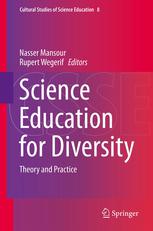

Most ebook files are in PDF format, so you can easily read them using various software such as Foxit Reader or directly on the Google Chrome browser.
Some ebook files are released by publishers in other formats such as .awz, .mobi, .epub, .fb2, etc. You may need to install specific software to read these formats on mobile/PC, such as Calibre.
Please read the tutorial at this link: https://ebookbell.com/faq
We offer FREE conversion to the popular formats you request; however, this may take some time. Therefore, right after payment, please email us, and we will try to provide the service as quickly as possible.
For some exceptional file formats or broken links (if any), please refrain from opening any disputes. Instead, email us first, and we will try to assist within a maximum of 6 hours.
EbookBell Team

4.8
64 reviewsReflecting the very latest theory on diversity issues in science education, including new dialogic approaches, this volume explores the subject from a range of perspectives and draws on studies from around the world. The work discusses fundamental topics such as how we conceptualize diversity as well as examining the ways in which heterogeneous cultural constructs influence the teaching and learning of science in a range of contexts.
Including numerous strategies ready for adoption by interested teachers, the book addresses the varied cultural factors that influence engagement with science education. It seeks answers to the question of why increasing numbers of students fail to connect with science education in schools and looks at the more subtle impact that students’ individually constructed identities have on the teaching and learning of science. Recognizing the diversity of its audience, the book covers differing levels and science subjects, and examines material from a range of viewpoints that include pedagogy, curricula, teacher education, learning, gender, religion, and ICT, as well as those of in-service and trainee teachers at all levels.